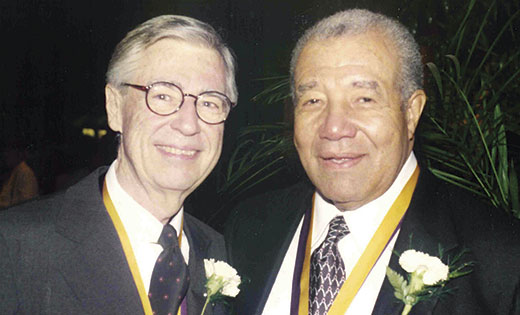PTS Remembers the Rev. Dr. James “Jimmy Joe” Robinson, Trailblazer and Bridge-Builder
 Pittsburgh Theological Seminary mourns the passing of the Rev. Dr. James “Jimmy Joe” Robinson Sr. ’59, who died July 14, 2025, at the age of 97. A Distinguished Alumnus in Pastoral Ministry Award recipient (2006) and John Anderson Award of Merit honoree (1997), alongside friend and classmate Fred Rogers ’62, Robinson’s legacy reaches across professional sports, the civil rights movement, urban ministry, and theological education.
Pittsburgh Theological Seminary mourns the passing of the Rev. Dr. James “Jimmy Joe” Robinson Sr. ’59, who died July 14, 2025, at the age of 97. A Distinguished Alumnus in Pastoral Ministry Award recipient (2006) and John Anderson Award of Merit honoree (1997), alongside friend and classmate Fred Rogers ’62, Robinson’s legacy reaches across professional sports, the civil rights movement, urban ministry, and theological education.
“Rev. Dr. Robinson was a living witness to what it means to lead with courage, compassion, and conviction,” said the Rev. Dr. Asa J. Lee, president of Pittsburgh Theological Seminary. “He didn’t just minister to people—he transformed communities. His life reminds us that theology is most powerful when it shows up on the street corner and in the sanctuary.”
Born Nov. 14, 1927, in Connellsville, Pa., Robinson became the University of Pittsburgh’s first Black varsity football player. He still holds a record for a 90-yard punt return against Penn State. Drafted in the third round of the 1950 NFL Draft by the Cleveland Browns, he later served in the Korean War and played briefly with the Pittsburgh Steelers and Montreal Alouettes.
Robinson’s call to ministry grew during his time in Canada, where he deepened his faith. He became the first Black Presbyterian minister in Kansas before returning to Pittsburgh and accepting a call to Bidwell Presbyterian Church in Manchester in 1962. There, his ministry became a catalyst for neighborhood transformation.
Alongside his beloved wife, Betty, Robinson launched a series of vital community efforts during the Civil Rights era and beyond. In response to the struggles of the labor force and addiction crisis, he founded the Bidwell Training Center. The Robinsons also established the Manchester Youth Development Center (which now includes the Manchester Academic Charter School), providing safe, enriching spaces for hundreds of children.
When violence erupted across cities following the assassination of Dr. Martin Luther King Jr., Manchester remained calm—thanks largely to Robinson’s deep relationships and unshakable leadership. His street ministry and advocacy drew young men into church, job training, and spiritual renewal.
Robinson marched in Selma, met with Malcolm X, and helped lead Pittsburgh’s civil rights protests. Yet he always returned home to the neighborhood he loved, ministering faithfully until his retirement in 1997.
Robinson leaves a towering legacy of faith, service, and transformation. In the neighborhoods he revitalized and in the lives he touched, his ministry endures.
